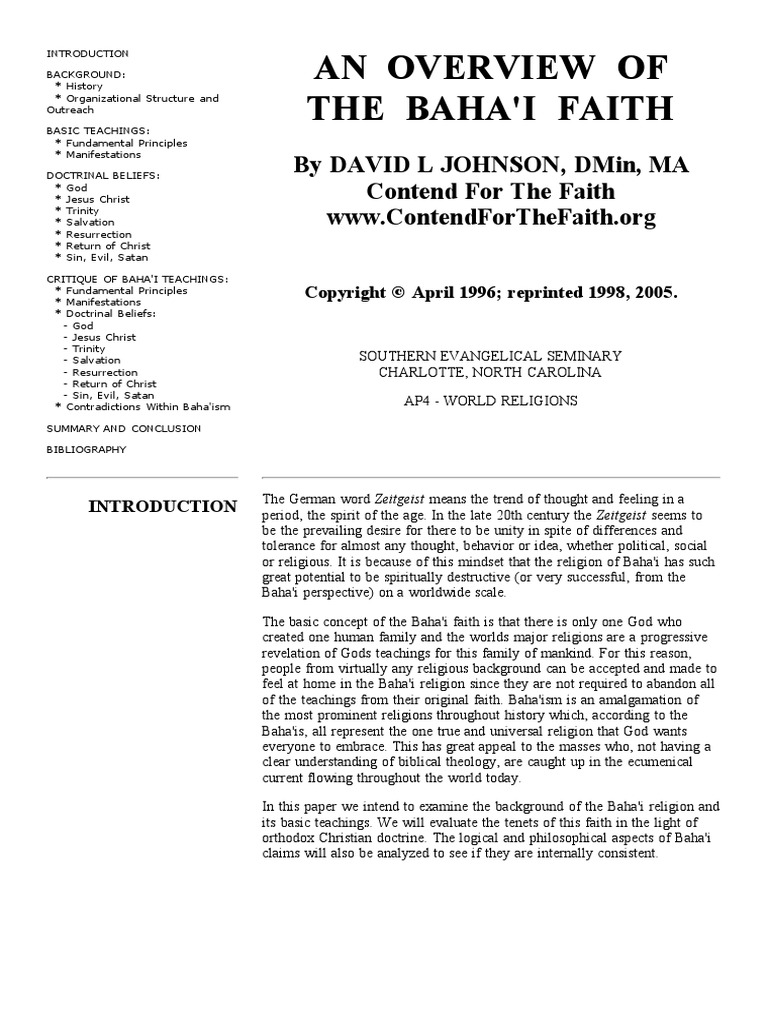The Baha’i Faith, established in the mid-19th century by Baha’u’llah, embodies a unique synthesis of spiritual and social principles that distinguish it from other world religions. Its core tenets are deeply rooted in the concept of unity—unity of God, humanity, and religion. This article delineates the fundamental teachings of the Baha’i Faith, elucidating what sets it apart from other faith traditions and how its doctrines can be applied to contemporary life.
1. The Concept of Progressive Revelation
One of the most salient features of the Baha’i Faith is the doctrine of progressive revelation. This principle posits that religious truth is revealed progressively throughout history, wherein each Prophet or Manifestation of God brings forth teachings pertinent to the age in which they appear. Such figures include Abraham, Moses, Jesus, Muhammad, and culminates with Baha’u’llah. This perspective indicates that all major world religions are part of a single, unfolding divine narrative, each contributing to a greater understanding of God’s purpose.
2. The Oneness of Humanity
Central to Baha’i teachings is the belief in the inherent oneness of humanity. This doctrine emphasizes that all people, regardless of race, religion, or nationality, are part of one human family. Baha’is work actively to promote harmony and justice, advocating for the elimination of prejudices in all forms. This contrasts sharply with many traditional religions that may prioritize specific communities or sects over universal inclusivity.
3. Emphasis on Social Justice
Baha’i teachings stress the imperative of social justice as a religious responsibility. The Faith advocates for equitable distribution of resources, educational access, and gender equality. Baha’is believe that true worship of God cannot be separated from service to humanity. This contrasts with many religious practices that may prioritize ritualistic observance over direct involvement in social issues. The Baha’i community actively supports initiatives that foster social stability and enhance the well-being of society at large.
4. Independent Investigation of Truth
Another distinctive aspect of the Baha’i Faith is the call for the independent investigation of truth. Baha’is are encouraged to seek their own understanding of spiritual principles and truth rather than accepting doctrines based solely on tradition or authority. This approach promotes a personal and intimate relationship between the individual and the divine, diverging from religions that may impose dogmas on followers without room for personal exploration.
5. Science and Religion: Two Wings of a Bird
The Baha’i Faith advocates for the harmony of science and religion, viewing both as essential to the advancement of civilization. Baha’is believe that true knowledge should cultivate moral and ethical understanding, thus rejecting the notion that faith and scientific inquiry are mutually exclusive. This inherent compatibility diverges from more fundamentalist interpretations of certain religions, where science is often viewed with skepticism or outright rejection.
6. Global Governance and Referral to an Unfolding World Order
The concept of a global governance system is integral to Baha’i teachings. Baha’is envision a future where global peace is achieved through collaborative governance that transcends national boundaries. This aspiration towards a unified world order sets the Baha’i Faith apart from many traditional faiths that often remain entrenched in nationalistic or cultural identities. The emphasis on collective decision-making is seen as a necessity for mankind’s survival and progression, especially in a world marked by conflict and division.
7. Universal Education
Education is considered a fundamental right and a primary avenue for the advancement of individuals and communities according to Baha’i principles. The teachings promote education for all, emphasizing the need for both academic and moral instruction. This focus on universal education distinguishes the Baha’i Faith, illustrating its commitment to empowering individuals through knowledge, thereby uplifting society as a whole.
8. Gender Equality
Baha’i teachings unequivocally promote gender equality, declaring the equal value of men and women in all aspects of life. Baha’is advocate for the full participation of women in all spheres, from family life to leadership roles in society. This stance represents a proactive approach to gender parity not uniformly embraced across many religious practices, where gender roles may still be sharply defined and often restrictive.
9. The Role of the Community
The Baha’i community functions as both a spiritual and social entity, encouraging collective action and decision-making. Local and national assemblies play a pivotal role in governance, fostering a sense of shared responsibility among believers. This model of community engagement emphasizes collaboration and mutual support, which may contrast with the individualistic or hierarchical structures seen in some other religions.
10. A Call to Action
The teachings of the Baha’i Faith encourage active participation in the betterment of society. Baha’is are implored to apply spiritual principles in everyday life, contributing positively to their communities and promoting values such as kindness, practice of the Golden Rule, and the pursuit of peace. The faith propounds that true spirituality must manifest in action, leading to tangible benefits in the physical world.
In conclusion, the Baha’i Faith presents a distinctive worldview that integrates spiritual and social dimensions. Its principles of unity, justice, equality, and the harmonious coexistence of science and religion provide a framework for addressing contemporary challenges, distinguishing it from many other religious systems. Through its teachings, the Baha’i Faith invites individuals to engage in a collective journey towards a peaceful and just global society.
